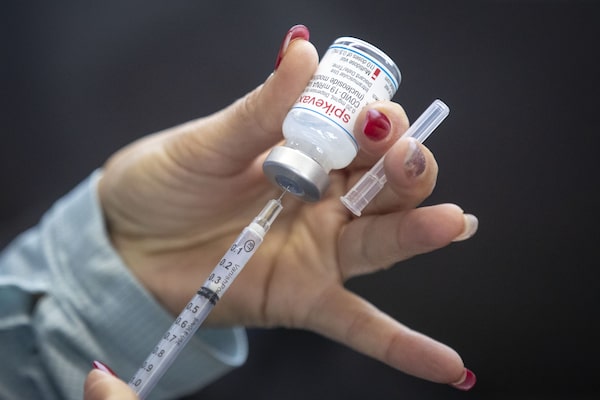
A person draws out Moderna vaccine during a drive through COVID-19 vaccine clinic at St. Lawrence College in Kingston, Ont., on Jan. 2, 2022.Lars Hagberg/The Canadian Press
A steep rise in respiratory viruses across the country, combined with low vaccine uptake and busy holiday get-togethers, are raising alarm among medical leaders and experts who say the spread of preventable illness is going to add more strain to an already overwhelmed health care system.
“There’s just a myriad of viruses that are under way right now,” said Kathleen Ross, president of the Canadian Medical Association. “There’s no question at all that our emergency departments and our hospitals are full to the gunwales.”
Influenza, respiratory syncytial virus (RSV) and SARS-CoV-2, which causes COVID-19, are all on the upswing across Canada. Theresa Tam, Canada’s Chief Public Health Officer, said the spread of seasonal viruses is “already posing significant challenges to hospitals.”
This week, the World Health Organization declared the rapidly spreading JN.1 subvariant as a “variant of interest” separate from its BA.2.86 parent lineage.
The updates on flu, COVID-19 and other respiratory viruses for last week
The JN.1 variant appears to be more easily transmissible than other circulating Omicron strains, given how fast it is growing. According to data from the Public Health Agency of Canada, JN.1 accounted for 0.2 per cent of all COVID-19 cases detected in the country as of mid-October. Forecasted estimates suggest that by Dec. 10, JN.1 would account for nearly 30 per cent of cases.
While there is no evidence that JN.1 causes more severe illness in those infected, the rapid spread will add pressure to hospitals, said Anne Gatignol, professor in the departments of medicine and of microbiology and immunology at McGill University.
“When more people are infected, the consequence is more people will go to the hospitals, even if the proportion of infected vs. hospitalized remains the same,” she wrote in an e-mail.
We must protect the most vulnerable Canadians from the risks of influenza
The good news is that there are now three updated COVID-19 vaccines in Canada that offer good protection against JN.1 and other circulating strains, Dr. Gatignol said.
According to PHAC, only 14.6 per cent of Canadians have received an updated COVID-19 vaccine this fall.
Hospitals are already dealing with overcrowding and long emergency waits, which experts say will likely worsen unless more people start to take protective measures to prevent the spread of illness, including mask wearing in public places, staying home when sick and getting vaccinated.
Spread of the flu has also been increasing across the country in recent weeks. According to the latest data released by PHAC, which go up to Dec. 9, rates of the flu are within expected levels for this time of year.
Alberta has been hit hard by the flu, with many sick individuals, particularly older adults and children, requiring hospital admission. According to the province’s flu dashboard, there have been 134 children under age five admitted to hospital as a result of the flu so far this year, and 541 admissions in people 60 and older. The province has recorded 34 flu-related deaths.
“We’re inundated with influenza,” said Mohit Bhutani, a respirologist based in Edmonton and president of the Canadian Thoracic Society.
Dr. Bhutani said he’s had a “steady stream” of patients admitted as a result of the flu, adding that most of them had not been vaccinated.
Only 22 per cent of the province’s population has been vaccinated against the flu this year, according to statistics provided on a provincial website. Comparable data for other jurisdictions are not readily available.
RSV, a common virus that can cause serious illness in children under two and in older adults, is also circulating, but within expected levels for this time of year, according to PHAC. There is a new treatment available for seniors to help prevent severe illness, but it costs several hundred dollars and is not covered in most areas.
Experts say they are hopeful that by late 2024, there will be wider availability and easier access to the vaccine to prevent serious illness in both seniors and young children.
What are your questions, thoughts and concerns about this year's respiratory virus season?
The Globe and Mail's weekday news podcast, The Decibel, wants to help you answer the questions you may have about RSV, COVID-19 and influenza this winter.
 Carly Weeks
Carly Weeks